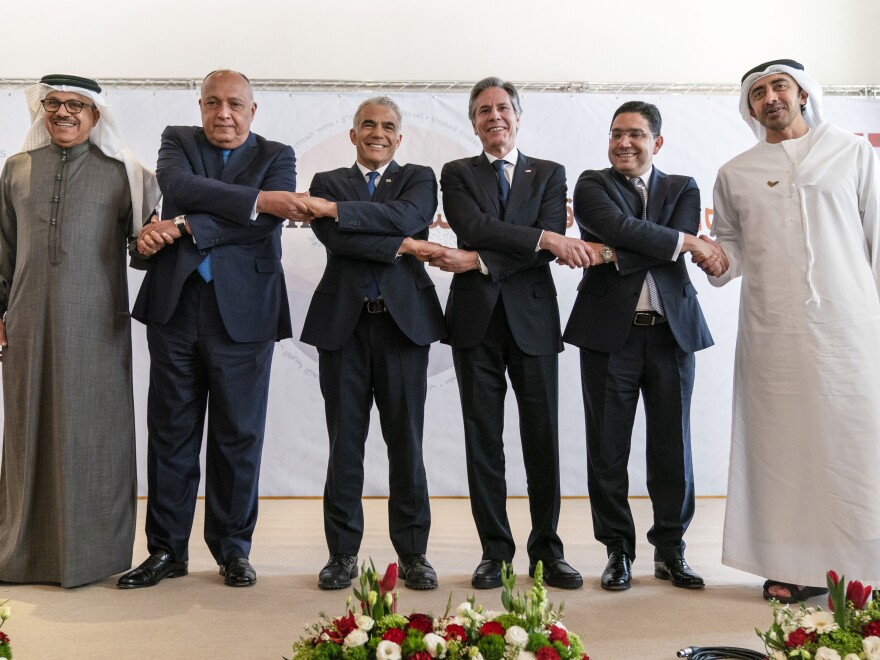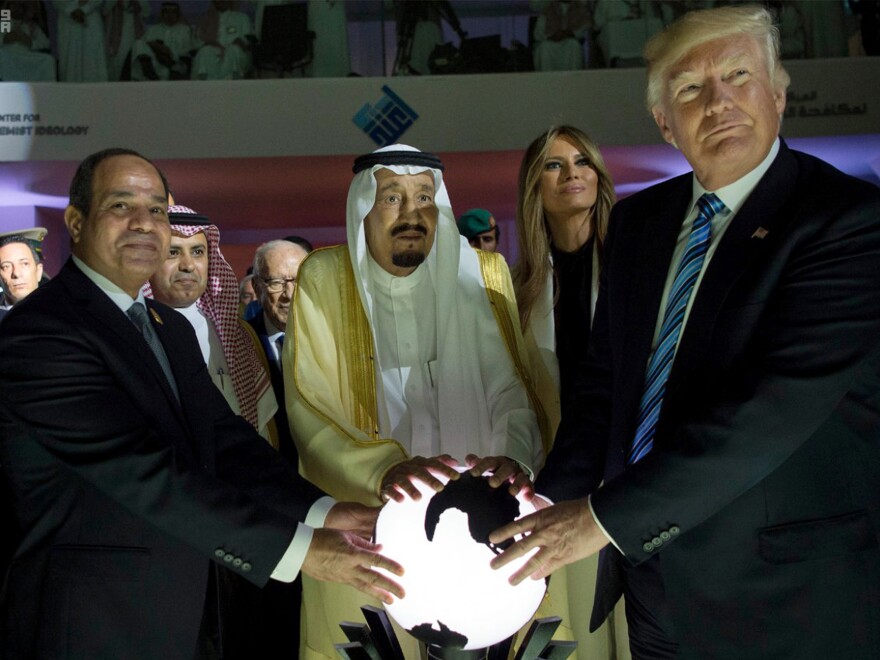President Biden travels to Israel and Saudi Arabia next week — his first trip to the Middle East since entering the White House.
And while the president has been eager to criticize a range of his predecessor's policies, he is fully embracing one key pillar of Donald Trump's Middle East policy — the Abraham Accords. Those deals were brokered by the Trump White House in 2020 to normalize relations between Israel and a number of Arab countries, including Bahrain, the United Arab Emirates, and Morocco.
It was a huge rupture from recent history in which Arab nations had made it clear they would not negotiate with Israel until Palestinians received an independent state of their own. In other words, the Arab-Israeli conflict was tied to the Israeli-Palestinian conflict, and one could not be resolved without the other.
But the Abraham Accords disconnected the two issues, and that framework has been embraced by the Biden White House.

Biden sees the agreements as a tool for promoting stability in the region
Biden has focused his foreign policy on countering China and Russia, and rebuilding alliances in Europe. When it comes to the Middle East, experts say Biden's goals are pragmatic. He has not articulated grand schemes to broker an Israeli-Palestinian deal, but instead wants to see a stable, secure Middle East that does not erupt into violence. His team sees the Abraham Accords as a tool that can promote stability.
In that vein, the Biden White House is not only embracing the accords, but also trying to build on them. The president and his team often speak about "integrating" Israel into the Middle East — a region that has long viewed Israel as an unfriendly interloper in the neighborhood.
"Part of the purpose — the trip to the Middle East — is to deepen Israel's integration into the region, which I think we're going to be able to do - which is good for peace, and good for Israeli security," Biden said recently in response to a question about his upcoming trip. "And that's why Israel leaders have come out so strongly for my going to Saudi."

The outcomes from this trip are expected to be modest
Biden plans to travel directly from Israel to Saudi Arabia: significant because the countries currently do not allow direct flights between one another. And Biden's trip could lead to some incremental movement in Saudi Arabia's relationship with Israel, such as allowing Israeli commercial planes to fly over Saudi Arabia.
But given the current domestic politics in both Israel and Saudi Arabia, foreign policy experts are not predicting the two countries will normalize relations in the near future.
"Why I have very modest expectations for Israeli-Saudi rapprochement [is] cause the Israelis are not in a position to give anything on Palestinians or anything else to the Saudis to make it more palatable," said Jon Alterman, a former State Department official, now with the Center for Strategic and International Studies, during a preview of the trip for reporters.
Still, experts say these baby steps could eventually lead to a possible roadmap for normalization some day in the future.
A senior Israeli official told reporters last week that getting Saudi Arabia to inch toward normalization would be a "game changer in the region."
"Getting Saudi Arabia to advance, if incrementally, towards normalization with Israel is important in the context of pushing back against the radical forces in the Middle East, pushing back against Iran," the official said.

Even in the heat of the election, Biden praised the accords
Trump unveiled the Abraham Accords in September 2020, during the heat of the presidential election campaign.
"After decades of division and conflict, we mark the dawn of a new Middle East," Trump promised as he welcomed officials from Israel, Bahrain and the UAE to the White House to sign the deal.
"These agreements prove that the nations of the region are breaking free from the failed approaches of the past," Trump said.
The accords were the first deal any Arab country had signed with Israel in 26 years. Until that day, the countries did not have any official economic or personal relationship with Israel.
At the time, then-candidate Joe Biden was taking every opportunity he could to point out how he would govern differently than Trump.
But in this case, he was quick to praise the accords. In a statement that day, Biden said he welcomed the news and would "build on these steps" if he won the election.

There is one big difference in Biden's approach to the accords
Once in the White House, Biden's White House did not initially focus on the accords. But in late March, at a summit in Israel, Secretary of State Antony Blinken made it clear where the administration stood.
"We are fully committed to expanding cooperation through the Abraham Accords, and building on the remarkable progress that Israel, Bahrain, the United Arab Emirates as well as Morocco have made in such a short period of time," Blinken said.
"Simply put, normalization is becoming the new normal in this region," he said.
But Blinken also underscored how Biden's approach would be different from the way Trump handled diplomatic relations in the region.
"We have to be clear that these regional peace agreements are not a substitute for progress between Palestinians and Israelis," Blinken said.
That distinction showed the Biden administration recognizes that "normalization between Arab states and Israel can't come at the expense of the Palestinians," said Khaled Elgindy, a former adviser to Palestinian leadership and now at the Middle East Institute.
Elgindy said Trump and then-Israeli Prime Minister Benjamin Netanyahu had used the accords to "marginalize the Palestinians, to weaken them, to take away leverage, to sort of force them to the negotiating table."

The Israeli-Palestinian conflict: sticking point, or separate issue?
Elgindy said he is still skeptical that the Arab-Israeli conflict can be kept separate from the Israeli-Palestinian conflict. Others disagree.
Since the 2002 Arab Peace Initiative, Arab countries, led by Saudi Arabia, had issued an ultimatum: they would normalize relations with Israel only in return for an independent Palestinian state, Israeli withdrawal from territory captured in 1967, and a resolution for Palestinian refugees.
But with the Abraham Accords, that consensus collapsed. Arab countries showed they were willing to bypass the Palestinian issue, which was a fundamental shift in the region.
"We changed the paradigm and we said: 'Alright: let's do business with Israel, and hopefully once we have more Arab voices, more influence, more seats on the table, we can have more of an influence on Israel as we talk about the two-state solution,'" said Yousef al-Otaiba, the UAE ambassador to the United States, who was intimately involved in negotiating his country's deal.
But in Washington, there is broad agreement that the accords are worth pursuing. In the first 48 hours after the UAE-Israel deal was announced, al-Otaiba said he spoke with 24 members of Congress - about half Republican, half Democrat.
"The question I got from every single one of the 24 is, 'What country's next?'" he said.

Biden may take a less transactional approach to the accords
UAE Ambassador Al-Otaiba credited top Trump officials — including the former president's son-in-law Jared Kushner — for getting the deal done. "I think we had the right people in the right places at the right time," he said. "All of my engagement was with the U.S. administration — I did everything through the United States."
He said it's plausible to expand on the accords with a new Democratic administration, but "it's just going to be a different method, different style, different technique."
Trump used a lot of tactics that Biden probably would not, according to Aaron David Miller, who's worked as a Middle East negotiator under both Republican and Democratic administrations.
For example, Trump announced on Twitter during his waning days in the White House that the United States would side with Morocco over a long-disputed territory in north Africa. It was a decision related to Morocco signing on to the accords.
"I doubt whether any Democratic administration would have given away sovereignty over the Western Sahara in exchange for an upgrade in relationship between Israel and Morocco," said Miller, now at the Carnegie Endowment for International Peace.
"That's Trump's transactional style."
Copyright 2022 NPR. To see more, visit https://www.npr.org.








